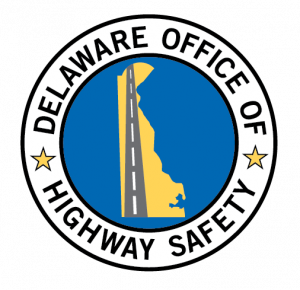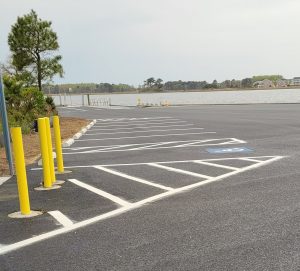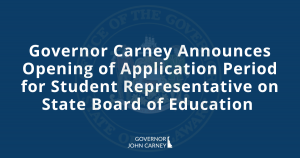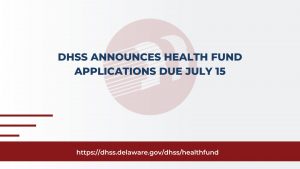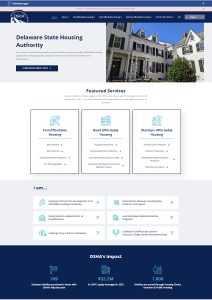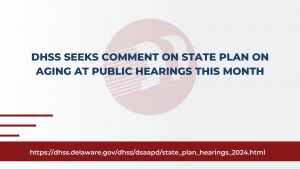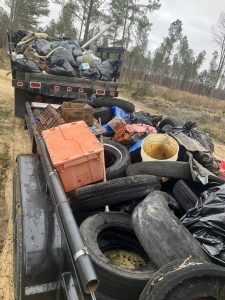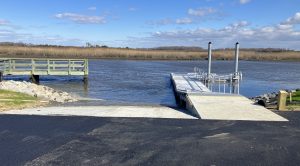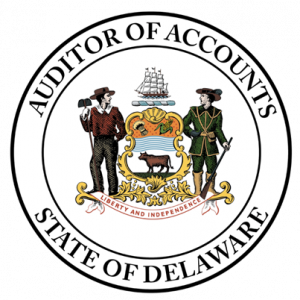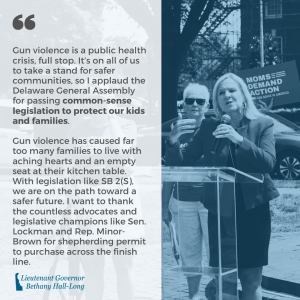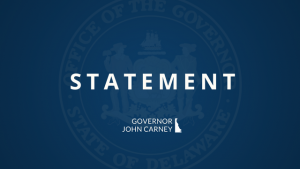Delaware
Delaware lawmakers to weigh bill to buy offshore wind power

More than a decade after Delaware first considered buying some of its electricity from future wind farms off the coast, it finally has a bill that would set it on a path to do so.
The Delaware Energy Solutions Act of 2024 was introduced in the General Assembly on April 18, and supporters say they’re cautiously optimistic that lawmakers will pass the measure in the approximately 10 weeks that remain in the current legislative session.
The bill would instruct the state, on its own or with other states, to seek bids from offshore wind developers to supply power to Delaware; draw power from a project generating 800-1,200 megawatts – enough to power at least 400,000 homes; pay no more than 110 percent of the average electricity price that consumers have been paying for electricity over the last three years, and invite bidders to include the benefits of their project for climate, the economy and public health.
The plan would also allow a developer to raise its costs by 2 percent a year to allow for inflation, a provision designed to avoid the disruption and even cancellation of some offshore wind projects in other states over the past year. Denmark’s Orsted, a leading wind developer, cancelled two planned wind farms off New Jersey last year, saying that inflation and supply-chain problems meant the projects were no longer economic at the price negotiated with the state.
Advocates for Delaware’s procurement of offshore wind power hailed the bill as a landmark in the state’s long, halting process of securing a major clean energy source that would help the state meet its goal of net-zero carbon emissions by 2050.
“This is a huge milestone,” said Kris Ohleth, director of the University of Delaware’s Special Initiative for Offshore Wind (SIOW), whose report to the State in 2022 recommended procurement because the cost of offshore wind had fallen significantly amid improved technology and rising demand from other states.
The SIOW report said the economics of offshore wind had improved since 2018 when Governor John Carney’s (D) working group concluded the price was too high for the state to step in. In 2011, a developer blamed the ending of federal tax credits for dropping a plan that could have made Delaware the first East Coast state to buy offshore wind power.
Now, the bill recognizes that a switch to renewable energy is “critical” to reducing greenhouse gas emissions, and that offshore wind represents an important opportunity for Delaware to advance its climate goals. It follows the Climate Action Plan (CAP), a Carney administration policy that commits the state to cutting emissions, and the Climate Change Solutions Act, a 2023 law that gives legal heft to the CAP.
The 19-page bill calls offshore wind a “significant opportunity for large scale renewable energy power for Delaware, reducing harmful emissions from power generation.”
It limits the per-megawatt hour cost of proposed projects to within 110 percent of the Delaware Benchmark Price, a new measure that adds the price of energy that Delmarva Power has been buying over the last three years to the cost of complying with the Renewable Energy Portfolio Standard – a state law requiring utilities to buy at least 40 percent of their energy from renewable sources like wind and solar by 2035.
The bill builds in “non-price criteria” including community benefits and workforce development that a developer could include in its bid, but said bidders have to meet cost requirements before the State Energy Office will evaluate the other factors.
And to ensure “checks” throughout the bidding process, the bill requires a solicitation to be proposed by DNREC’s State Energy Office, reviewed by the Renewable Energy Task Force, and approved by the Public Service Commission.
The Department of Natural Resources and Environmental Control sent what it called “model legislation” to lawmakers after producing its own report late last year recommending that Delaware moves ahead with offshore wind procurement.
The bill is being introduced by state Sen. Stephanie Hansen (D-Middletown), chair of the Senate’s Environment, Energy and Transportation Committee. She also heads an Energy Stakeholders Group of utility executives, state energy officials, academics and environmentalists that has been scrutinizing the bill, and have mostly supported it.
An exception is David Stevenson, an energy analyst at the Caesar Rodney Institute, a free-market research group. He argued that offshore wind is more expensive than new nuclear power, onshore wind, hydrogen and carbon capture at existing coal and natural gas power plants.
At a meeting of the Stakeholders group on April 12, Hansen made a series of technical or language changes to the bill following comments at the group’s previous meeting on March 28. She said she hopes to get the bill through the Senate by the end of April and to introduce it in the House in May.
Dustyn Thompson, director of the Delaware Sierra Club, and a member of the Stakeholders’ panel, said there is “certainly” enough support in the Senate for the bill to get approved but that “the House we need to work on.”
Asked whether he expects the bill to become law this year, Thompson said: “I have very high hopes that it will. It comes down to how much support we can build in the House. It’s a different political animal, and ultimately, I think it’s going to come down to that.”
But State Rep. Rich Collins, (R-Millsboro), said he will vote against the bill because offshore wind is a more expensive source of energy than any other kind and because he believes Delaware’s legally required net-zero emissions goal is unattainable regardless of what forms of energy the state uses.
Collins, speaking after seeing an early draft of the bill, also said it gives too much power to the State Energy Office which he said is unelected and of unknown competence. “We have decades of experience of government meddling in energy, and they have screwed up virtually every opportunity they’ve had,” he said.
But he said there’s a “better than 50-50” chance that the Energy Solutions Act will be approved by the House, where Democrats outnumber Republicans by 26 to 15.
Throughout the East Coast, state commitments to buying offshore wind power have underpinned the industry’s investment of billions of dollars in planned wind farms. If the new bill becomes law, Delaware would be the last Atlantic state to procure the power, and developers are showing strong demand for a piece of the state’s power market as it nears a green light on the plan, experts say.
“The level of interest in bidding into a Delaware procurement, pending details in the final legislation, is quite high,” said Evan Vaughan, executive director of Mid-Atlantic Renewable Energy Coalition (MAREC Action), a trade group for wind and solar developers. “There are several lease areas near the coast of Delaware that could bid into and ultimately serve Delaware’s electricity demand. So those leaseholders are excited about the prospect of a potential market in Delaware, and would be ready and willing to submit bids.”
The industry sees the bill’s plan for a 2 percent annual cost-escalator as a sign that Delaware’s leaders are working on a “solutions-oriented” approach to building offshore-wind infrastructure, Vaughan said.
“Both the legislature and the Carney administration are thinking very hard about crafting a policy to grow offshore wind in the state,” he said. “We welcome the chance to engage with them on that.”
He argued that offshore wind is a critical source of emissions-free energy that will help coastal states like Delaware meet their climate goals.
“Even with the economic challenges that the entire energy sector has faced over the last few years, the fundamental value proposition for offshore wind is very strong,” Vaughan said. “It’s dependable, and produces a lot of energy, and it’s close to where people live. I really see offshore wind as a keystone of any coastal state as these states seek to decarbonize their economies.”
Still, Ohleth of SIOW questioned whether the proposed 2 percent escalator would be high enough to attract developers, given that it is less than the current national rate of inflation.
“Offshore wind will have a hard time meeting a 2 percent cap,” she said. “Other states like New York and New Jersey have offered more flexible approaches. So it may be a little bit aspirational; their costs will probably rise closer to inflation. I don’t know that it’s a death knell for the bill but it’s likely that when developer comments come in, we’ll see pushback that they need more generous terms.”
And the bill’s inclusion of “add-ons” such as workforce development and the health benefits of non-fossil fuel energy could deter developers by raising the costs of a bid beyond just the cost of generating power, Ohleth warned. The extra cost requirements may make offshore wind power look more expensive than it is, fueling the arguments of its foes, she said.
“It’s going to continue to make offshore wind appear to be more expensive than other forms of electricity generation,” she said. “How do we really do an apples-to-apples comparison of the generation costs of two kinds of electricity if there are billions of dollars of add-ons?”

Delaware
*Update – Victim Identified* State Police Investigating Fatal Motorcycle Crash Near Middletown – Delaware State Police – State of Delaware

Delaware State Police have identified 61-year-old Ronald Clift of New Castle, Delaware, as the man who died in the fatal motorcycle crash near Middletown on April 28, 2024.
The Delaware State Police Troop 2 Collision Reconstruction Unit continues to investigate this incident. Troopers are asking anyone who witnessed this crash to contact Sergeant J. Jefferson by calling (302) 365-8484. Information may also be provided by sending a private Facebook message to the Delaware State Police or contacting Delaware Crime Stoppers at 1-800-847-3333.
If you or someone you know is a victim or witness of a crime, or you have lost a loved one to a sudden death and need assistance, the Delaware State Police Victim Services Unit / Delaware Victim Center is available to offer you support and resources 24 hours a day through a toll-free hotline at 1-800-VICTIM-1 (1-800-842-8461). You may also email the Victim Services Unit at DSP_VictimServicesMail@delaware.gov.
View All News Posts
Delaware
Governor Carney Announces Delaware’s General Obligation Bonds Again Earn Triple-A Ratings and Attract Excellent Pricing – State of Delaware News
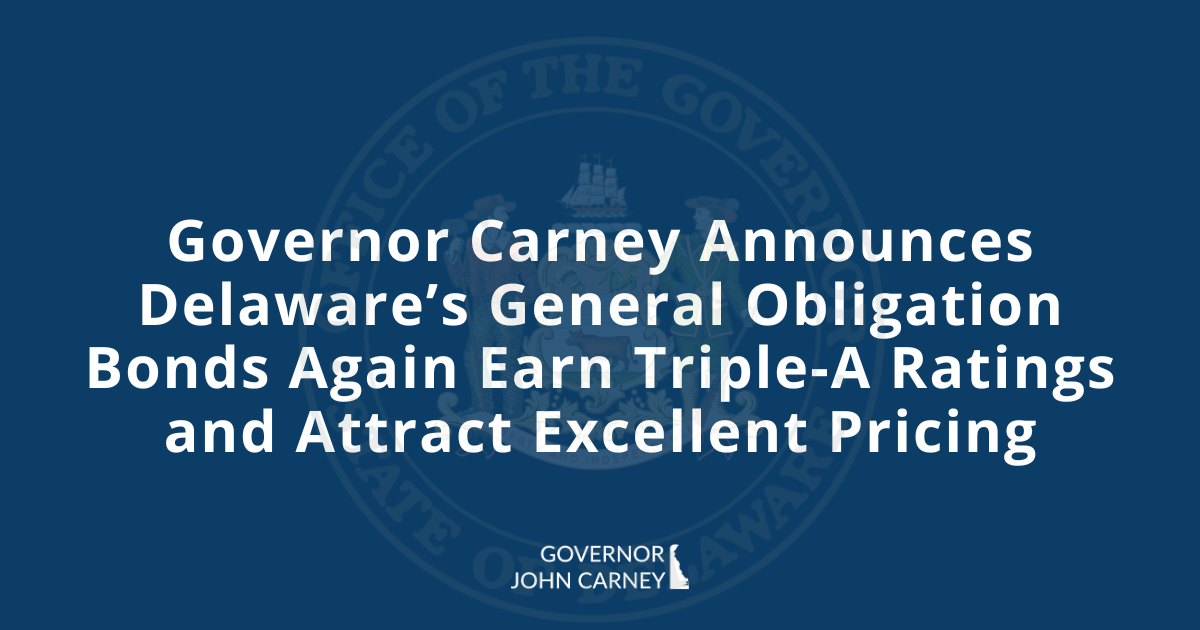

WILMINGTON, Del. – Governor Carney on Tuesday announced that the State of Delaware has once again received the highest possible AAA/Aaa ratings from the nation’s top rating services.
The State of Delaware received competitive bids on Tuesday for its upcoming sale of $359 million of General Obligation Bonds. The State’s bonds carry the highest possible ratings assigned by the nation’s major rating services – Fitch, Moody’s, KBRA and S&P Global Ratings – contributing to excellent results for the State and Delaware’s taxpayers.
“Delawareans deserve a state government that responsibly manages taxpayer dollars,” said Governor John Carney. “I was proud to work with then-Governor Tom Carper in the 1990s when Delaware first achieved a triple-A rating from the major bond rating agencies. Over the last quarter century — through good times and bad — our General Assembly and Governors worked hard to sustain our commitment to economic growth and responsible financial stewardship. I’m confident this will remain a top priority for Delaware’s leaders.”
Ratings are assigned based on criteria that include the State’s financial performance and management, overall debt load, and approach to long-term issues ranging from financial obligations to economic development trends. The highest ratings, Aaa/AAA, are granted to states that are best managed and prepared to meet debt obligations during periods of recession or fiscal stress. The higher a state’s credit rating, the lower its cost to repay bonds.
“Bond buyers continue to show a strong appetite for investing in Delaware. Despite a significantly higher interest rate environment today than just a couple years ago, today’s bids were very competitive,” said Secretary of Finance Rick Geisenberger. “The State’s total interest costs on its new bonds is 3.51%. That’s an increase of about 40 basis points versus last year’s bonds, consistent with Federal Reserve Policy moves over the last year. State taxpayers also realized $6.1 million in savings by refinancing $77 million of existing debt.”
All three rating reports related to the upcoming sale noted the importance of the State’s responsible budget practices and debt management practices. Fitch stressed the “proactive management and institutionalized protections designed to ensure surplus operations.” S&P’s report commented, “the State limits tax-supported debt…and adheres to clearly defined affordability parameters and rapid amortization.” Moody’s focused their comments on “strong limits on appropriations … while allocating surplus funds to non-recurring projects.” All agencies continue to regard the ratings as “stable” underpinned by the state’s strong reserves and continued economic growth.
“Delaware’s financial condition has never been stronger,” said Treasurer Colleen Davis. “The Delaware Treasury in collaboration with the Cash Management Policy Board continues to monitor strong liquidity and reserves. This lowers the State’s borrowing costs and increases interest income available for critical investments in schools, public safety, and our quality of life.”
Proceeds of the sale will fund a portion of the State’s capital program as well as refund previous bonds to realize debt service savings. Closing on the sale and receipt of bond proceeds is scheduled for May 15, 2024.
Rating reports can be found at the Delaware Department of Finance’s website.
Related Topics: general obligation bonds, triple-A rating
Keep up to date by receiving a daily digest email, around noon, of current news release posts from state agencies on news.delaware.gov.
Here you can subscribe to future news updates.

WILMINGTON, Del. – Governor Carney on Tuesday announced that the State of Delaware has once again received the highest possible AAA/Aaa ratings from the nation’s top rating services.
The State of Delaware received competitive bids on Tuesday for its upcoming sale of $359 million of General Obligation Bonds. The State’s bonds carry the highest possible ratings assigned by the nation’s major rating services – Fitch, Moody’s, KBRA and S&P Global Ratings – contributing to excellent results for the State and Delaware’s taxpayers.
“Delawareans deserve a state government that responsibly manages taxpayer dollars,” said Governor John Carney. “I was proud to work with then-Governor Tom Carper in the 1990s when Delaware first achieved a triple-A rating from the major bond rating agencies. Over the last quarter century — through good times and bad — our General Assembly and Governors worked hard to sustain our commitment to economic growth and responsible financial stewardship. I’m confident this will remain a top priority for Delaware’s leaders.”
Ratings are assigned based on criteria that include the State’s financial performance and management, overall debt load, and approach to long-term issues ranging from financial obligations to economic development trends. The highest ratings, Aaa/AAA, are granted to states that are best managed and prepared to meet debt obligations during periods of recession or fiscal stress. The higher a state’s credit rating, the lower its cost to repay bonds.
“Bond buyers continue to show a strong appetite for investing in Delaware. Despite a significantly higher interest rate environment today than just a couple years ago, today’s bids were very competitive,” said Secretary of Finance Rick Geisenberger. “The State’s total interest costs on its new bonds is 3.51%. That’s an increase of about 40 basis points versus last year’s bonds, consistent with Federal Reserve Policy moves over the last year. State taxpayers also realized $6.1 million in savings by refinancing $77 million of existing debt.”
All three rating reports related to the upcoming sale noted the importance of the State’s responsible budget practices and debt management practices. Fitch stressed the “proactive management and institutionalized protections designed to ensure surplus operations.” S&P’s report commented, “the State limits tax-supported debt…and adheres to clearly defined affordability parameters and rapid amortization.” Moody’s focused their comments on “strong limits on appropriations … while allocating surplus funds to non-recurring projects.” All agencies continue to regard the ratings as “stable” underpinned by the state’s strong reserves and continued economic growth.
“Delaware’s financial condition has never been stronger,” said Treasurer Colleen Davis. “The Delaware Treasury in collaboration with the Cash Management Policy Board continues to monitor strong liquidity and reserves. This lowers the State’s borrowing costs and increases interest income available for critical investments in schools, public safety, and our quality of life.”
Proceeds of the sale will fund a portion of the State’s capital program as well as refund previous bonds to realize debt service savings. Closing on the sale and receipt of bond proceeds is scheduled for May 15, 2024.
Rating reports can be found at the Delaware Department of Finance’s website.
Related Topics: general obligation bonds, triple-A rating
Keep up to date by receiving a daily digest email, around noon, of current news release posts from state agencies on news.delaware.gov.
Here you can subscribe to future news updates.
Delaware
Baseball: Auten continues strong sophomore season with another gem for Delaware Valley

Rahway NJ: Burglaries and car thefts on the rise in Rahway, police say
The Rahway Police Department reports a significant uptick in residential break-ins linked to a growing trend of high-end vehicle theft groups operating within the state. Seen here is an alleged attempted vehicle theft incident.
ALEXANDRIA – The best chance Bernards High School’s baseball team had of breaking through on Delaware Valley ace lefty Ryan Auten Tuesday afternoon was in the first inning.
The Mountaineers loaded the bases with one out on two singles and walk. But the 6-foot-5 sophomore struck out two to end the threat. He eventually got in his rhythm and did what’s come to be expected of him – he dominated.
The Terriers had a four-run fourth inning sparked by senior Brady Riordan’s three-run homer and went on to win 5-0.
More: Baseball April roundup: Results, analysis, links for GMC, Skyland and area Union County
More: Vote: Central Jersey Area Readers’ Choice Baseball Player of the Week poll for Week 4
Auten allowed only those two first inning hits, struck out 12 and walked two in his 5 2/3 inning, 91-pitch effort. Dan Shapiro went the last 1 1/3 innings.
“I struggled in the beginning with walks, but then focused up, threw strikes, got my pitches in and did my thing,” said Auten.
Del Val took a big step in taking the Skyland Conference Valley Division title. The Terriers (8-3-1) are 5-1-1 in the division with one game left with Phillipsburg. Bernards (6-6-1) is 4-2 with games against Phillipsburg and Gill St. Bernard’s left.
Auten was coming off an 111-pitch, 6 1/3 inning effort against Gill St. Bernards last Thursday so coach Marty White was sure not to push the youngster.
“He’s fantastic, and I think he might be the best pitcher in the conference,” said White. “When he comes out and hits his spots, I mean he just starts going and blowing past batters.
“He’s legit, he’s gonna be a D1 player somewhere, We weren’t going to run him past 90 (pitches) today. He had a 4 1/2 day rest and we felt comfortable with that.”
Auten pitched five innings with 10 strikeouts and five walks against Bernards April 11 in a 4-2 win. Shapiro got the win in relief.
Bernards senior ace Evan Hoeckle, who took the loss in that game despite 6 1/3 strong innings, went six innings in the rematch, He allowed seven hits with six strikeouts, a walk and a hit by pitch.
“We didn’t put the ball in play enough,” said Bernards coach Jeff Falzarano. “We took too many fastballs down the gut, and you have to hit fastballs. You can’t let him get into a positive count. We have to play better defense, and we can’t strike out 14 times.”
Sophomore Cooper Fransen had two hits, a run scored and stolen base for Del Val. Junior catcher Matt Falzarano – coach Falzarano’s son – had two hits and a walk.
-

 Education1 week ago
Education1 week agoVideo: Dozens of Yale Students Arrested as Campus Protests Spread
-

 News7 days ago
News7 days agoLarry Webb’s deathbed confession solves 2000 cold case murder of Susan and Natasha Carter, 10, whose remains were found hours after he died
-

 World6 days ago
World6 days agoHaiti Prime Minister Ariel Henry resigns, transitional council takes power
-

 Politics1 week ago
Politics1 week agoFetterman hammers 'a–hole' anti-Israel protesters, slams own party for response to Iranian attack: 'Crazy'
-

 World1 week ago
World1 week agoPeriod poverty still a problem within the EU despite tax breaks
-

 World7 days ago
World7 days agoUS secretly sent long-range ATACMS weapons to Ukraine
-

 News6 days ago
News6 days agoFirst cargo ship passes through new channel since Baltimore bridge collapse
-

 World1 week ago
World1 week agoTurkey’s Erdogan meets Iraq PM for talks on water, security and trade











